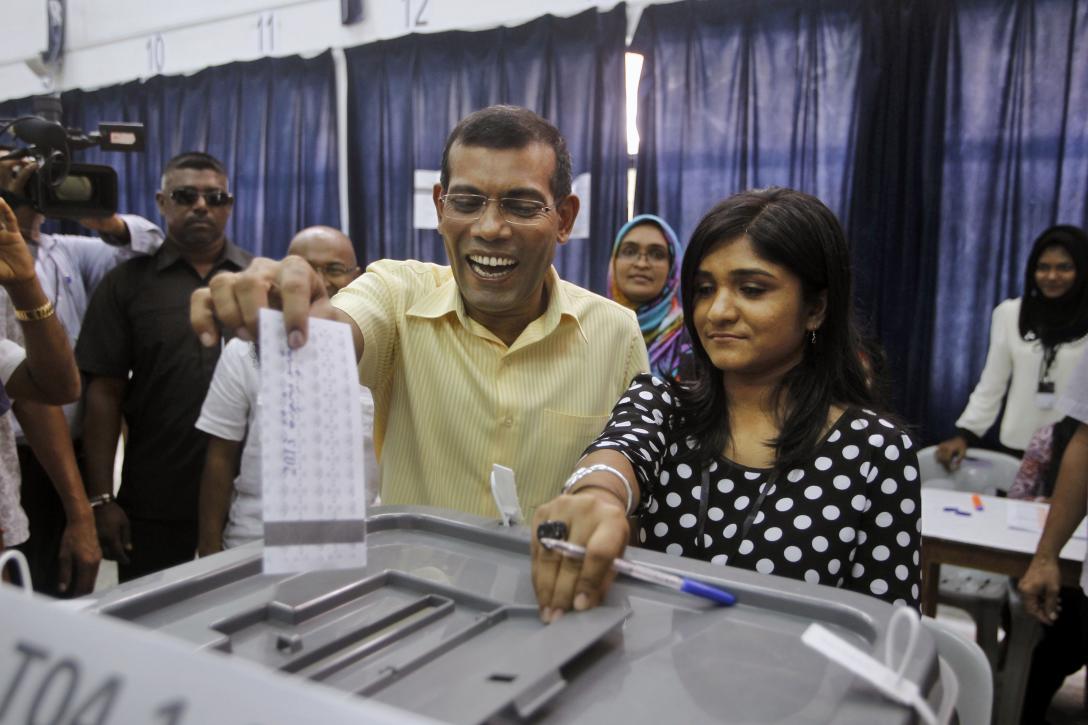Most visitors arrive at the country’s airport island, take a speed boat or seaplane to their expensive coral-fringed private resort and spend the next week relaxing in blissful ignorance of the country around them.
It has been this way for decades, the result of a deliberate policy of keeping the wealthy holidaymakers – mostly Westerners and often newly-weds – on uninhabited islands separate from the local Muslim population.
The Islamic Republic applies different laws for both: travellers are free to drink alcohol, eat pork, and for those not on their honeymoon, enjoy pre-marital sex. Elsewhere, Maldivian women can be flogged in public for fornication.
”Since Maldives is a Muslim country, we have always supported the idea that the tourism industry should be separate from the inhabited islands,” says Mauroof Hussain, vice president of the conservative Adhaalath Party.
”If the hippy-type of travellers come, along will come drugs and narcotics which even now our society is suffering from,” says Mauroof whose party has been a minority partner in successive governments since 2008.
While the archipelago is still far from the hippy trail, the sight of backpackers wandering around Male and the nearby island of Maafushi is growing thanks to a new policy to attract budget travellers.
”Things like nudity are not acceptable in a place where people are living,” adds Mauroof. “The people complain that they are praying in the mosque and just outside there are tourists in bikinis.”
Since a reform under the country’s first democratically-elected president Mohamed Nasheed in 2009, Maldivians have been allowed to open their own guesthouses on populated islands.
While fundamentalist interpretations of Islam imported from the Gulf and Pakistan are progressively taking root in the Maldives, Mauroof’s views lie far outside the mainstream and are ridiculed by many.
What started as a trickle of guesthouses has become a torrent with entrepreneurs like 25-year-old Ibrahim Mohamed converting properties and profiting from what is the islands’ biggest business and foreign exchange earner.
”Maldivians are very welcoming people. It wasn’t Maldivians that wanted separation, it was the government and a few businessmen saying that they should be isolated,” Ibrahim told AFP. “The Maldives can’t hide from the world anymore.”
His three-roomed Sundhara Palace located on a busy street of the cramped capital Male opened at the beginning of September, offering basic en-suite accommodation for US$30 (RM94) a night.
The cheapest resorts are usually about 10 times this, with prices stretching up to several thousand dollars a night – with expensively priced food and drink on top.
Ibrahim stresses that the guesthouse policy is also “a good system to get money to the people instead of to wealthy businessmen”.
A handful of well-connected resort owners who prospered under the 30-year autocratic rule of strongman Maumoon Abdul Gayoom continue to control the Maldives economy and are active in politics.
These oligarchs have united against Mohamed Nasheed, who was ousted in February 2012 following a mutiny by security forces which he branded a “coup.”
His efforts to return to power through the ballot box have since been thwarted with the country wracked by protests and uncertainty after the Supreme Court annulled elections he won on September 7.
The court order came in response to a legal challenge from the third-placed candidate Gasim Ibrahim, one of the country’s wealthiest tycoons who is in alliance with the Adhaalath Party.
A re-run of the polls was ordered for Oct 19, with the British government warning travellers to avoid demonstrations and take precautions in the capital.
(Note: voting was delayed and will now be held on Nov 9.)
If re-elected, Nasheed has promised in to expand the guesthouse policy as part of his ambitious social and economic reform programme.
”The industry is flourishing very rapidly. We feel there is so much more scope for that,” he told reporters days before voting in the first round of the election in September.
One of the people to take advantage of the changes is Dutch tourist Chris Constandse, a 27-year-old web designer who works for a travel website in Amsterdam.
He booked a few nights at a hotel in the capital, but plans to spend the rest of his two-week holiday staying in guesthouses dotted around the country of more than 1,000 islands.
”Backpackers go to India, Sri Lanka, Thailand and I was like ‘I always do things different’, so I thought I’d go backpacking in the Maldives,” he told AFP shortly before leaving on a ferry for one of the nearby islands.
”The most important thing is that you get in touch with the people. I’ve stayed in Male for three nights and I’ve already met some people and made some friends.” – AFP Relaxnews
Source : http://www.thestar.com.my/Travel/Asia

